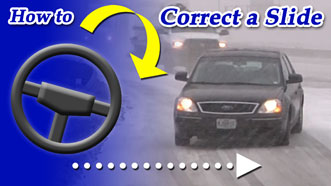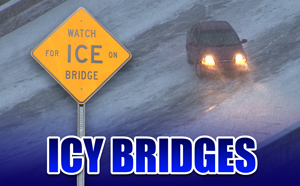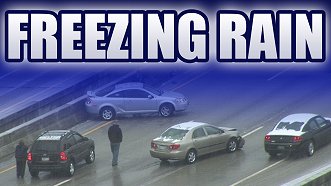Icy Roads: News and Updates Blog
February 2009 Archives
Monday, February 23, 2009
Indiana records 50th icy road death this season 
An SUV sliding on an icy road into a moving train in Michigan City on Saturday resulted in the state of Indiana reaching the 50 mark in its already tragic icy road toll. After a brief warmup brought a lull in the USA's accident rate, the return of winter weather to much of the country has resulted in a spike of at least 18 deaths in the 5 days since Wednesday the 18th. (Detailed stats here)
Thursday, February 19, 2009
US icy road toll hits 400; preliminary findings 
STATS: Icy road accident fatality data for 2008-2009 winter season
The death toll due to icy road accidents this winter in the United States has hit 400. We have averaged 100 fatalities per month since November, and there is no reason to believe that March will be any different. This leads me to predict that despite March being a 'transition month' with warming temperatures, we may very well reach the 500 mark by the end of the season.
While this season's data collection efforts are not yet complete, there are several conclusions that I can safely make about what has already been observed:
- Icy road death rates are highest in rural areas. This is apparently the main reason that the Midwest has seen the most fatalities. In rural areas, cars are more likely to be traveling on interstates and secondary roads at high speeds (over 45-50mph) when accidents occur. The Midwest has a low population density with large distances between major cities and towns. By contrast, the northeast US states (and many metro areas in the Midwest) have had a very low incidence of icy road fatalities, despite having a much higher population density and a greater amounts of vehicular traffic.
Death/major accident rates on icy roads are low to nonexistent when low speeds are involved - such as on surface streets and inner-city freeways, where traffic and lower speed limits prevent vehicles from reaching high speeds.
- Icy road death rates are maximized in a winter climate 'transition zone'. The harsh winters of the northern US states would lead one to believe that icy road deaths should be highest there. However, the public awareness and preparedness levels in these areas usually counter the increased frequency and duration of icy road conditions. Moving a few hundred miles south to a region where winter conditions are more intermittent, the data changes. Areas in the Midwest that only see occasional winter precipitation have very high accident and fatality rates. This can be attributed to the much lower awareness/preparedness levels on the part of the general public to the hazard.
Moving even farther south, icy road death totals are comparable or even greater than those in many northern states. For example, Texas and Oklahoma only experience icy road conditions a few times a year - however, more deaths occur in those few events compared to northern states that see a significantly higher frequency of icy road conditions.
The other factor that deserves mention is that the Midwest sees more freezing rain events than areas farther north, and that most icy road events in the deep south are due to freezing rain. Death rates in freezing rain events are much higher than with any other precip type (which brings up the next point).
- Freezing rain has the highest accident and death rate of any precipitation type. While I did not compile a complete dataset of precip types for every fatal accident recorded, it was very apparent that freezing rain was responsible for significantly higher death rates over that of snow and sleet. Some of the most deadly winter storm events were those where the ptype was all freezing rain.
As I've previously noted, the reason for the high death rates in freezing rain/drizzle is that the phenomenon is invisible to motorists. Snow is highly visible when it is falling, and turns road surfaces white as the icy road conditions develop. This gives drivers ample warning to adjust their speed and driving behavior before they encounter more severe road conditions. Freezing rain gives no such visual warning, which results in accidents occuring suddenly at high speeds before drivers have a chance to prepare and adjust their behavior accordingly.
More total deaths occured in snow events than in freezing rain, however this is attributable to the fact that snow is far more common than freezing rain. No single snow event, however, came even close to approaching the single-storm death toll from the worst freezing rain events of the season. Again, it is vehicle speed that is a factor in most icy road deaths. Heavy snowstorms tend to inhibit travel and overall vehicle speeds, therefore major snow accumulations (over 4 to 5 inches) tend to result in very few icy road deaths. Most snowstorm-related icy road deaths occur at their onset, when awareness levels are lower and lighter accumulations allow for higher speeds.
- Lack of seat belt use accounts for a significant percentage of icy road deaths. Again, as with the ptype data, I did not record seat belt use (or non-use) data in connection with each fatal crash. However, the significance of this factor was more than apparent, as a very large percentage of the news reports on each fatal accident noted that the victim(s) were not wearing a seat belt (and in many cases was ejected from the vehicle). In fact, the percentage of fatalities resulting from lack of seat belt use may be over 50 percent (more than half) of the recorded incidents.
Next season, I plan to record seat belt use data, as well as precipitation type data, so as to reinforce these conclusions.
And finally, one conclusion that I am ready to make with near 100% certainty is the following:
To the average person, freezing rain is the deadliest weather hazard in the USA.
No other weather phenomena has more propensity for death and destruction than freezing rain - the king of all extreme weather. Not tornadoes, not hurricanes, lightning nor floods. One only has to look at the death rates during freezing precipitation and the damage totals in major ice storms (rivaling hurricanes) to draw that conclusion. The mere mention of 'Freezing Rain' needs to strike fear in the heart of people just like tornadoes and hurricanes currently do. I hope we'll see a difference made as people begin to realize how much of a threat this underrated killer is.
Thursday, February 12, 2009
Deadly secondary crashes 
Secondary crashes are a common cause of icy road fatalities, two more of which happened this week. A 'secondary accident' refers to one where the first accident driver exits his vehicle, and then is struck by additional vehicles that lose control in the same location. It is very common for multiple vehicles to lose control on the same icy section of road, which means it is imperative that occupants remain in their vehicles. Standing on or along an icy road makes you a sitting duck. Unless you can safely and quickly get off the road (up a hill, behind a guardrail), you should always stay in your car - it can withstand impacts that your body outside cannot!
NEWS REPORT: Burien, WA secondary crash death
NEWS REPORT: Thornton, NH secondary crash death
Wednesday, February 4, 2009
Icy roads keep plaguing Indiana 
Heavy, sudden snow squalls caused several major pileups on Indianapolis-area interstates on Tuesday, including a 28+ vehicle accident on I-69 that resulted in at least 2 fatalities.
NEWS REPORT: theindychannel.com
NEWS REPORT: firehouse.com
These incidents bring Indiana's already astounding icy road death toll this season up to 47. (Detailed stats here).
Reference:
1. Based on an online search of news media articles nationwide. (See accident list.)
2. From 1961-1990, Source: National Weather Service (data link)
Recent Blog Posts
- Developing a road impact parameter for forecast models and mesoanalysis - October 29, 2021
- The deadly Fort Worth, Texas pileup of February 11, 2021: Its cause, contributing factors and future prevention - March 31, 2021
- Major road icing event affects 41 states - January 14-18, 2018 - January 20, 2018
- Trip to Mississippi and Alabama for Southern US winter storm - January 5-7, 2017 - January 22, 2017
- High-impact freezing rain/drizzle road icing event from Oklahoma to the East Coast - December 20, 2016
- New educational winter driving videos released, more planned - November 21, 2016
- "Icezilla" freezing rain disaster in the northeast US - January 19, 2015
- December 30-January 2 Oklahoma/Texas icing event sequence - January 2, 2015
- Freezing rain disaster - November 22, 2014 - November 23, 2014
- Report: Major winter storm in the Deep South, 1/28 - January 30, 2014
- Report: High Risk road icing event in south Texas/Louisiana - January 26, 2014
- Winter tires: not the solution for preventing icy crashes - December 13, 2013
- Preliminary low estimate of December 3-8 toll - December 9, 2013
- The Top 7 Icy Road Myths - December 6, 2013
- Aren't icy road crashes caused by driving too fast for conditions, not ice and snow? - November 14, 2012
- Road icing news for January-February 2012 - February 25, 2012
- Commentary on the recent viral WV pileup video - January 8, 2012
- Significant road icing outbreak: Monday, January 2, 2012 - January 2, 2012
- No vehicle can safely go highway speeds on icy roads - December 23, 2011
- Another case for "Road Ice Warnings": December 8-9, 2011 light snow event - December 10, 2011
- A big thanks to those helping raise road icing awareness - November 18, 2011
- 15 road icing deaths in the past week: estimating the full impact - November 4, 2011
- 2011-2012 road ice season in the US already in full swing - October 22, 2011
- Coming this winter: another 2011 tornado season toll - July 21, 2011
Past Blog Archives
- April 2010 - January 2011 posts
- December 2009 - March 2010 posts
- November 2009 posts
- October 2009 posts
- March-April 2009 posts
- February 2009 posts
- January 2009 posts
- December 2008 posts
Educational Winter Driving Videos - Watch for Free:
  
Home | Risk | Stats | Accident Video | Icy Bridges | Tips | Warning Signs | If You Slide | If You Wreck
1,836
Average annual
deaths in the US
from icy roads
136,309
Average annual
injuries in the US
from icy roads
[ More Statistics ]
|
|
|

